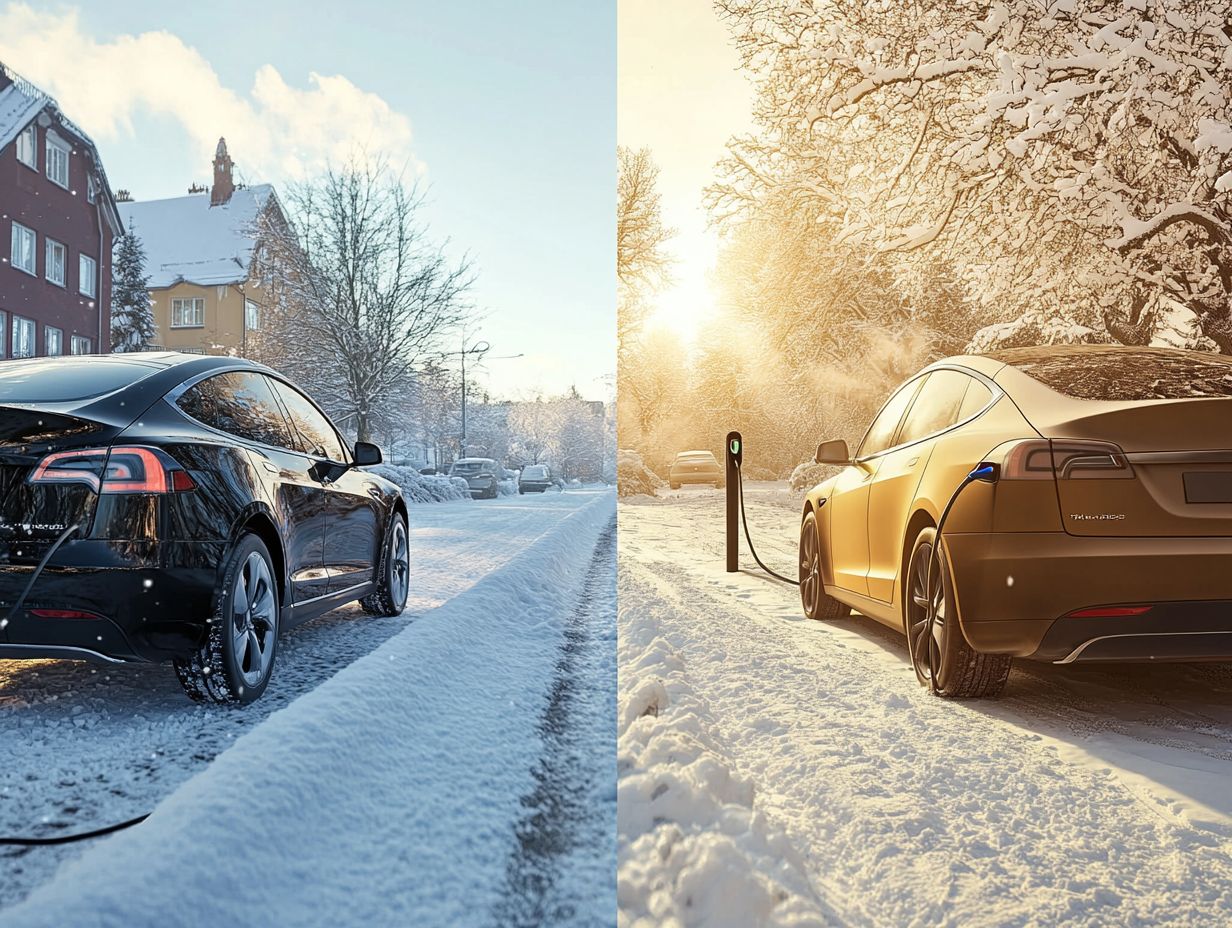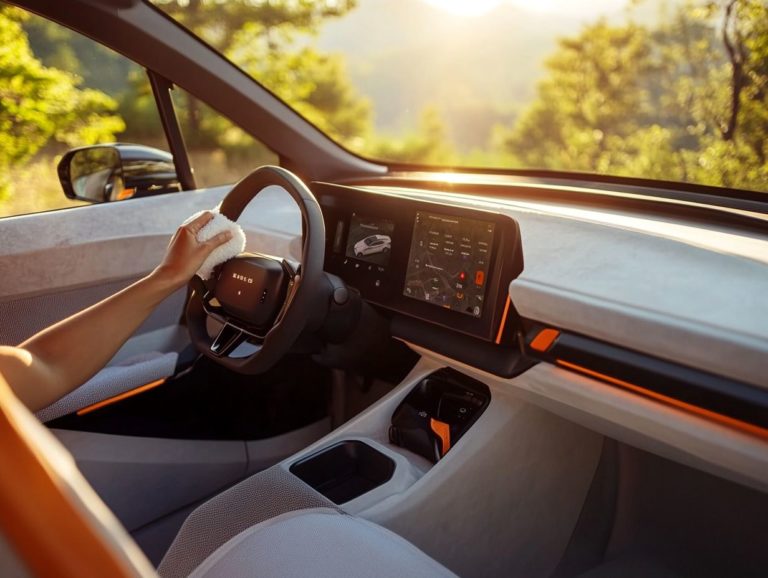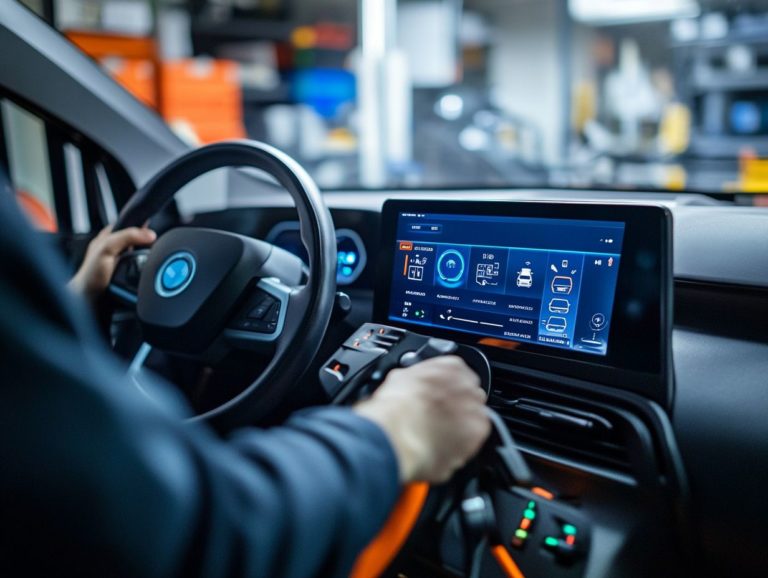How Weather Affects Your EV’s Performance
Mastering EV performance can dramatically enhance your driving experience! Understanding how weather affects electric vehicle (EV) performance is essential for you as an EV owner.
Temperature fluctuations, humidity, and precipitation are just a few environmental factors that can significantly influence battery life, traction, and overall efficiency.
This article delves into these effects comprehensively, providing you with practical tips to optimize your EV’s performance across varying weather conditions. Regular maintenance is crucial for keeping your vehicle in peak condition, no matter what challenges Mother Nature presents.
Contents
Key Takeaways:

- Extreme temperatures can affect your EV’s battery life and performance. Hot weather can decrease range, while cold weather can reduce battery efficiency.
- Humidity and air density also play a role in EV performance. Higher humidity and lower air density can reduce range and acceleration.
- Proper maintenance is crucial for optimal EV performance. Regularly check and maintain your battery, tire pressure, and tread for improved efficiency and performance.
Understanding EV Performance
Understanding EV performance is essential for anyone looking to optimize efficiency and longevity. Many things affect this, including your driving habits, temperature conditions, and battery management systems.
Take electric vehicles like the Ford Mustang Mach-E, Hyundai Ioniq 5, Tesla Model Y, and Volkswagen ID.4, for instance. They each offer a range of performance metrics that can be greatly influenced by environmental conditions.
Gaining insight into these variables gives you the power to make informed decisions about your driving range and energy consumption, enhancing your overall driving experience.
Factors that Impact Performance
Many things affect the overall performance of electric vehicles, particularly when it comes to driving range and battery capacity, both of which are sensitive to temperature and driving conditions.
For example, extreme temperatures can profoundly affect battery chemistry and efficiency, leading to changes in energy output. In colder climates, your battery might struggle to deliver optimal power, resulting in a noticeable reduction in driving range. Excessive heat can also lead to overheating, jeopardizing the battery’s longevity.
Your driving habits also play a pivotal role in energy consumption; aggressive acceleration and frequent braking can further diminish how far your vehicle can travel on a single charge. Understanding these dynamics is essential if you wish to maximize your EV’s performance across varying environmental conditions.
Weather and its Effects on EV Performance
Let’s explore how weather impacts your EV. Weather significantly influences the performance and efficiency of electric vehicles, directly affecting driving range and battery life in varying conditions. For instance, maintaining your EV’s performance in summer is crucial, as elements like temperature, humidity, and precipitation can alter how your electric car operates.
For instance, vehicles such as the Ford Mustang Mach-E and Tesla Model Y might display different performance metrics depending on whether you re in a cold or hot climate. By understanding these weather-related impacts, you can make informed decisions about your vehicle and adjust your driving habits to maximize efficiency.
Temperature and Battery Life
Temperature plays a crucial role in the life and efficiency of the rechargeable batteries commonly found in electric vehicles. This creates a marked contrast in battery performance between cold and hot conditions.
Extreme temperatures can exacerbate the natural degradation process of these batteries, leading to diminished range and subpar performance. For example, in colder climates, thicker electrolyte solutions can form, slowing down chemical reactions and limiting energy output.
Elevated temperatures can heighten internal resistance and accelerate aging, ultimately resulting in a decline in overall battery capacity. Research shows that maintaining an optimal temperature range is essential for prolonging battery longevity.
Insights from Consumer Reports reveal that users who actively manage their vehicle s temperature enjoy significantly improved battery performance and extended lifespans. By understanding these impacts, you can take better care of your electric vehicle and maximize its efficiency.
Don t wait! Optimize your EV now to avoid performance drops during extreme weather. Take these tips to heart and ensure your electric vehicle is ready for whatever nature throws at it!
Humidity and Air Density

Humidity and air density are vital factors that significantly influence the performance of electric vehicles, affecting everything from energy efficiency to driving range.
When humidity levels rise, the density of the air decreases. This can markedly change an EV’s aerodynamics. This lighter air can lead to reduced drag, potentially boosting speed and efficiency under specific conditions. However, this shift in air composition affects your vehicle’s handling as well.
The altered driving dynamics may require you to adjust your acceleration and braking techniques. As humidity increases, overall energy consumption can vary. You should carefully consider your trip planning.
By understanding these intricacies, you can optimize your driving strategies, ensuring you get the most out of your EV in varying weather conditions.
Precipitation and Traction
Precipitation can significantly impact traction in electric vehicles, playing a vital role in your overall EV performance and driving safety.
When rain or snow blankets the road, it creates slick conditions that can challenge even the most advanced electric vehicle systems. Regularly assess your tires performance as optimal tire conditions can mean the difference between smooth handling and an unsettling slip.
The unique weight distribution of electric vehicles adds another layer of complexity to their response on wet or icy surfaces. This amplifies the importance of good tread depth and proper tire pressure. Prioritize safety and keep your tires in top condition to enhance your EV s ability to navigate unpredictable weather with confidence.
Essential Tips for Your EV in Any Weather!
Adopt these important strategies now to boost your EV s performance!
Hot Weather
- Use air conditioning wisely.
- Cool down your vehicle in advance while it s plugged in.
- Adjust driving habits to avoid rapid acceleration and heavy braking.
Regularly monitor your battery’s health and performance metrics to give you the power to make informed decisions. Ensure your specific model, whether it s a Tesla Model 3 or a Nissan Leaf, operates efficiently even in high temperatures.
Incorporating these strategies can lead to longer ranges and an overall better driving experience.
Cold Weather
In cold weather, preheating your car and using heated seats can greatly improve battery performance and overall energy efficiency. Warm your battery before driving to reduce strain and prevent potential damage.
Minimize reliance on power-hungry features, like the air conditioning system, during those initial moments to conserve energy. Embrace efficient driving habits such as gradual acceleration and maintaining a steady speed to preserve energy.
Regular maintenance checks on battery connections and keeping your battery charged can help tackle challenges posed by cold temperatures. This proactive approach leads to a smoother, more reliable driving experience.
What strategies do you use? Share your thoughts below!
Rainy or Snowy Weather

Rainy or snowy weather brings its own set of challenges for electric vehicle drivers, especially regarding traction and overall driving conditions.
Navigating these challenges is crucial for your safety on the road. In wet conditions, maintaining proper vehicle handling becomes a top priority. You need to be mindful of how reduced traction affects your stopping distances and steering responsiveness.
Regular tire maintenance is key here. Well-treaded tires are essential for grip and effective water displacement. Ensuring your tires are properly inflated and have sufficient tread depth can significantly improve your performance when the roads are slick.
Battery performance can also change in these conditions, so it s wise to check your charging levels regularly. Cold or wet weather can impact both your range and efficiency, so staying vigilant is essential for a smooth drive.
Importance of Regular Maintenance for Optimal EV Performance
Keeping your EV in top shape is essential for a smooth ride! Regular maintenance influences everything from battery life to tire pressure and overall driving efficiency.
By keeping up with these essential tasks, you ensure that your vehicle operates at its best, enhancing your driving experience and maximizing its longevity.
Battery Care and Maintenance
Effective battery care and maintenance are essential for extending both the life and efficiency of the batteries used in your electric vehicle.
By adopting a few best practices, you can significantly enhance your battery’s performance. For instance, maintain optimal charging habits like avoiding frequent full charges to help preserve your battery’s health. It s equally important to keep your battery within a reasonable temperature range, as extreme heat or cold can dramatically impact its lifespan.
Avoiding deep discharges is crucial. Consistently allowing your battery level to drop too low can cause irreversible damage. By managing these factors mindfully, you can ensure improved performance and a longer life for your electric vehicle s batteries.
Tire Pressure and Tread
Maintaining proper tire pressure and tread depth is essential for ensuring the best performance of your electric vehicle in varying driving conditions. This crucial aspect of vehicle care enhances efficiency and significantly contributes to the overall longevity of your tires.
By checking tire pressure regularly, you can avoid unnecessary energy loss. Under-inflated tires, or tires that don’t have enough air, can lead to decreased range and increased rolling resistance. Evaluating tread conditions is equally important; worn tires can compromise traction and control, especially in challenging weather.
Be proactive by routinely checking tire tread depth and inflation levels. This will ensure optimal handling, reduce the risk of flats, and ultimately enhance your driving experience in your EV.
Frequently Asked Questions
How does extreme heat affect my EV s performance?

Extreme heat negatively impacts your EV s performance. High temperatures can decrease your battery s efficiency, resulting in reduced driving range and slower charging times. It can also cause faster degradation of your battery, reducing its overall lifespan.
How does cold weather affect my EV s range?
Cold weather can significantly decrease your EV s range. The battery s performance is affected by the temperature. In extreme cold, the battery may not output as much power, resulting in reduced range and slower charging times.
What can I do to improve my EV s performance in extreme weather?
To improve your EV s performance in extreme weather, you can take a few simple steps. Pre-condition your battery before driving, use seat warmers instead of the cabin heater, and avoid fast acceleration and hard braking. Keeping your car in a garage or shaded area can also help minimize the effects of extreme heat.
Check your EV today or consult with a certified EV technician to ensure it’s ready for any weather!
How does humidity affect my EV s performance?
Humidity can slightly impact your EV’s performance. In high humidity, the denser air increases drag, which can reduce your range, but this effect is usually minimal.
Can severe weather conditions damage my EV?
Severe weather, like extreme heat or cold, can harm your EV’s battery. Protect your vehicle by avoiding long periods in direct sunlight and following maintenance guidelines.
How can I prepare my EV for different weather conditions?
Regularly check your battery s health and performance. Monitor the battery level and look for warning signs. Follow the manufacturer’s recommendations for different weather conditions to keep your EV safe.






